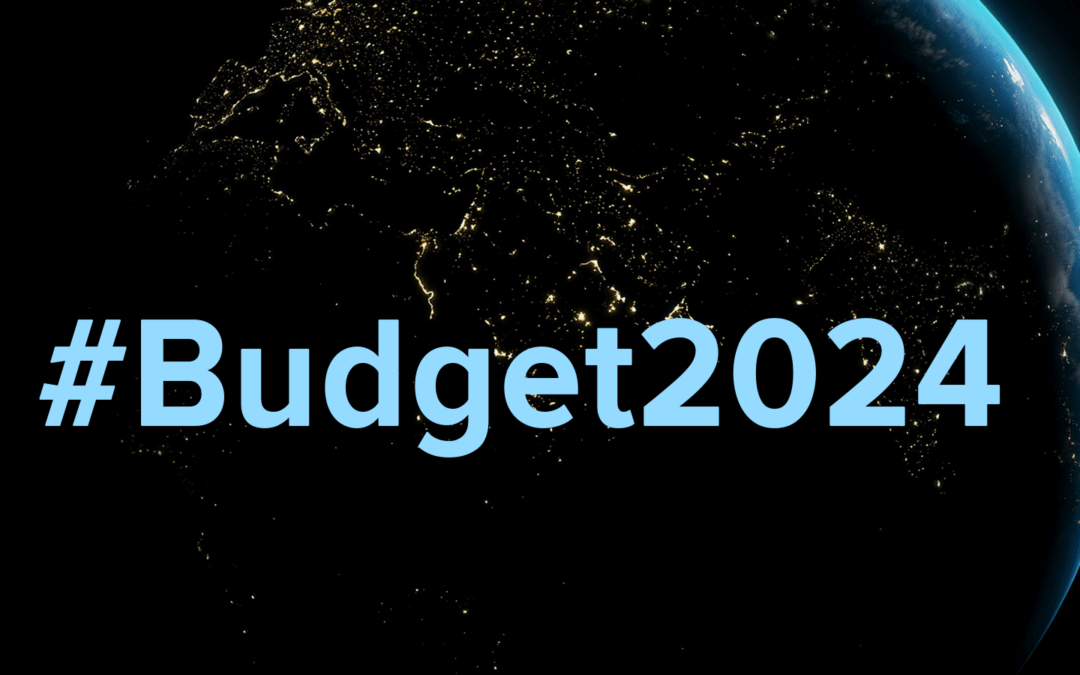
by Cooperation Canada | Apr 16, 2024 | Finance, News, Statement
Ottawa, April 16, 2024 A coalition of Canadian international cooperation organizations welcomes new funding for humanitarian programs committed as part of Federal Budget 2024. The coalition recognizes that this new investment comes in a complex economic environment for Canada and emphasizes the need for the government to continue to play its part on the global stage.
With today’s announcement of $350 million over two years in additional humanitarian aid, the government is taking an important step toward addressing some of the most pressing global needs. This additional funding to the International Assistance Envelope (IAE) has the potential to go towards addressing some of the world’s most devastating crises, including the war in the Middle East, internal chaos in Haiti, civil unrest in Sudan, and crises in Yemen and the Sahel.
As the international community grapples with unprecedented challenges, the Canadian aid sector remains steadfast in its commitment to alleviating suffering and advancing progress across the globe. The coalition, led by the Bigger Than Our Borders campaign, Cooperation Canada, Canadian Partnership for Women and Children’s Health (CanWaCH) and other advocacy groups, pledges to continue advocating for a robust commitment to international assistance as Canada is slated to host the Group of Seven (G7) countries next year. We encourage the government to use the upcoming G7 Presidency to further demonstrate its leadership by engaging other nations towards reversing the global decline in official development assistance.
“This budget is addressing one of the most urgent situations right now globally: the desperate situation for millions of people suffering from humanitarian crises and conflicts. From Gaza to Sudan, Haiti to Yemen, humanitarian needs are surging and decades of progress on development are perilously under threat. We welcome this investment in humanitarian aid, and look forward to further critical investments in long-term development assistance”, said Kate Higgins, Cooperation Canada’s CEO, representing over 100 Canadian international development and humanitarian organizations. “Aligned with Canada’s Feminist International Assistance Policy, this investment will support life-saving programs in communities in crisis, while also supporting global security and prosperity for Canada.”
The international cooperation sector also welcomes that Budget 2024 makes new commitments to enhance Canadian engagement with international financial institutions to make them more responsive to emerging global threats. The budget also points to future initiatives that will seek to catalyze private and philanthropic sources of funding in support of international assistance.
“Canadians expect their government to invest in the long-term safety and security of the country. In a world order distorted by conflict and crisis, Canada is being called on to find global pathways to peace. We celebrate today’s investment in humanitarian aid that will reach and support women and children in their most vulnerable moments through high impact interventions that save lives and help children reach their full potential,” said Julia Anderson, CEO of the Canadian Partnership for Women and Children’s Health.
About Cooperation Canada
Since 1968, Cooperation Canada has brought together Canadian civil society organizations working in international development and humanitarian assistance. With over 100 members, we work with partners in Canada and around the world to build a fairer, safer and more sustainable world.
About Bigger Than Our Borders
Bigger than our Borders is a compelling campaign backed by NGOs that aims to drive the Canadian government towards a significant boost in foreign aid funding. With our deep commitment since 2018, Bigger than Our Borders unites with a collective of NGOs and philanthropic institutions to advocate for the government’s increased contribution to international assistance, ensuring that it meets its responsibility and increases the current funding levels.
About the Canadian Partnership for Women and Children’s Health (CanWaCH)
The Canadian Partnership for Women and Children’s Health (CanWaCH) is a proud membership of more than 100 non-governmental organizations, academic institutions, health professional associations and private sector entities partnering to advance women and children’s health and rights around the globe.
Contact Information:
Louis Belanger – Bigger Than Our Borders 613-265-4417 / [email protected]
Gabriel Karasz-Perriau – Cooperation Canada 514-945-0309 / [email protected]
Megan Aikens – CanWaCH 613-504-2862 / [email protected]
Note: The coalition of aid agencies represents a broad group of organizations working in the fields of advocacy, education, economic development, gender equality and women’s rights, women’s and children’s health, sustainable livelihoods, food and water security, nutrition, human rights and good governance, all who work for a safer, fairer and more sustainable world.
The group includes:
Cooperation Canada / Coopération Canada
Canadian Partnership for Women and Children’s Health (CanWaCH) / Le Partenariat canadien pour la santé des femmes et des enfants (CanSFE)
Bigger than our Borders / Au-delà de nos frontières
Acted Canada
Action Against Hunger Canada
Action Canada for Sexual Health and Rights
ADRA Canada
Alberta Council for Global Cooperation
Association québécoise des organismes de coopération international (AQOCI)
Atlantic Council for International Cooperation
CAMFED Canada
Canadian Association for Global Health
Canada International Scientific Exchange Program (CISEPO)
Canadian Association of Midwives (CAM/ACSF)
Canadian Center for Women Empowerment
Canadian Feed The Children
Canadian Foodgrains Bank
Canadian Lutheran World Relief
Canadian Physicians for Aid and Relief (CPAR)
Canadian Network for Neglected Tropical Diseases
CARE Canada
CAWST
CDF Canada
Centre D’Étude et de Coopération Internationale (CECI)
Change for Children
ChildCare International
Children Believe
Climate Action Network Canada (CAN-Rac)
Coady Institute
CODE
Collaboration Santé Internationale
Compassion Canada
Crossroads International
Cuso International
Development and Peace ― Caritas Canada
Développement international Desjardins (DID)
Effect Hope (The Leprosy Mission Canada)
End Female Genital Mutilation (FGM) Canada Network
Equality Fund
Equitas-International Centre for Human Rights Education
Farm Radio International
Food for the Hungry Canada
Global Citizen
Grandmothers Advocacy Network
Habitat for Humanity Canada
Health Partners International Canada
HelpAge Canada
Hope and Healing International
HOPE International Development Agency
Humanitarian Coalition
Humanity & Inclusion Canada
Hungry For Life International
International Council of AIDS Service Organizations (ICASO)
International Development and Relief Foundation (IDRF)
International Development Enterprises (iDE) Canada
Islamic Relief Canada
Jane Goodall Institute of Canada
Journalists for Human Rights (JHR)
KAIROS: Canadian Ecumenical Justice Initiatives
Kentro Christian Network
Lawyers Without Borders Canada / Avocats sans frontières Canada
Manitoba Council for International Cooperation
Maternal and Infant Health Canada
Maternity Today
Médecins du Monde Canada
Mennonite Central Committee Canada
Mennonite Economic Development Associates (MEDA)
Mission inclusion
Never Again International – Canada
Northern Council for Global Cooperation
Nutrition International
ONE Canada
One Drop Foundation
Ontario Council for International Cooperation
Orbis Canada
Oxfam Canada
Oxfam-Québec
Partners In Health Canada
Plan International Canada
Presbyterian World Service & Development
Results Canada
Right To Play International
Salanga
Santé Monde
Saskatchewan Council for International Cooperation
Save the Children Canada
SeedChange
Seva Canada
SOCODEVI
SOS Children’s Villages Canada
Trade Facilitation Office (TFO) Canada
UPA Développement international
Veterinarians without Borders Canada
VIDEA
WaterAid Canada
The Primate’s World Relief and Development Fund (PWRDF)
The Wellspring Foundation for Education
Women’s Global Health Innovations – Bfree Cup
World Accord International Development Agency
World Renew
World University Service of Canada (WUSC)
World Vision Canada
ZMQ Global
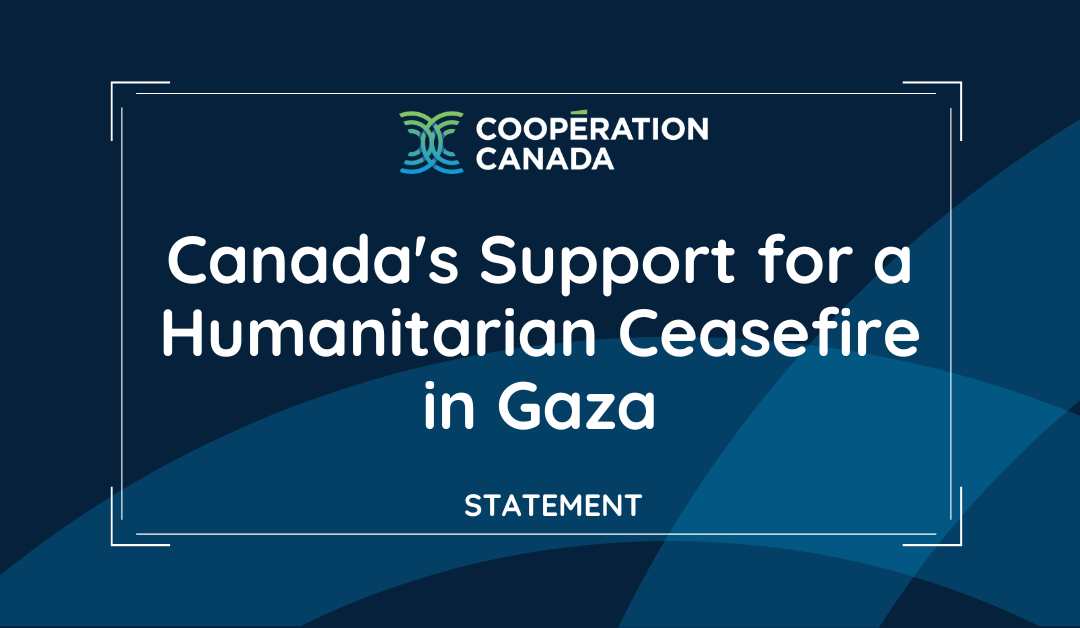
by Cooperation Canada | Dec 15, 2023 | News, Policy, Statement
Cooperation Canada welcomes Canada’s support on 12 December 2023 of a UN General Assembly resolution demanding an immediate humanitarian ceasefire in Gaza. We stand alongside other Canadian organizations, including several Cooperation Canada members, who have been calling tirelessly for the protection of civilians and upholding of legal and humanitarian obligations.
Since the horrific Hamas-perpetrated attacks on 7 October 2023 that claimed the lives of 1,200 largely Israeli civilians and led to the abduction of over two hundred persons, many of whom continue to be held hostage, Cooperation Canada has been observing the escalation of conflict, onslaught on civilians, breakdown of humanitarian systems, and profound disrespect for both international law and international humanitarian law in Gaza, West Bank and Israel. Based on United Nations data from 11 December 2023, there have been over 18,000 casualties in Gaza, with additional reported injuries amounting to nearly 50,000, and almost 1.9 million people, or nearly 85 percent of the population, are estimated to be internally displaced. It is estimated that approximately 70 percent of casualties consist of women and children. There has also been an escalation of violence in the West Bank.
The change in Canada’s position in favor of a ceasefire sends a strong message to the international community that bilateral relationships cannot and should not supersede international humanitarian law and international human rights law. More importantly, it means a chance at life for women, children, and young people living in catastrophic conditions. While the humanitarian pause of 24-30 November 2023 allowed an increase in the delivery of humanitarian aid to Gaza, indiscriminate bombing of civilian areas and infrastructure resumed quickly thereafter. This resumption of violence strongly suggests that a long-term ceasefire is needed to prevent the continued mass tragedy suffered by the Palestinian civilians.
To reiterate our statement issued on 13 October 2023, we recognize the Government of Canada’s funding for humanitarian assistance to address urgent needs stemming from the crisis in the Gaza Strip, the West Bank, Israel and neighbouring areas. While humanitarian organizations can now expect to soon resume their work to rescue, care for, and save human lives, Canada should continue to engage diplomatically to ensure a sustainable ceasefire and lasting peace in Gaza, West Bank and Israel.
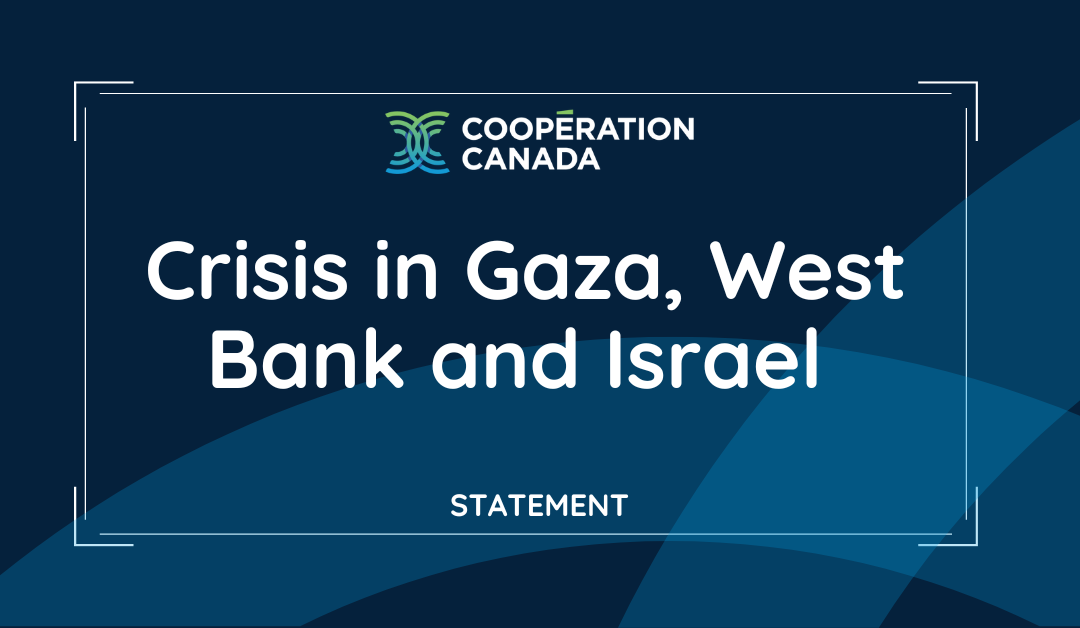
by Cooperation Canada | Oct 13, 2023 | Humanitarian Assistance, News, Statement
Cooperation Canada is horrified by the escalating violence and loss of life in Gaza, West Bank and Israel, and sympathizes with the victims and their families. We are deeply concerned by the worsening humanitarian crisis and call for an immediate end to the violence.
Cooperation Canada urges all parties engaged in the conflict to respect International Humanitarian Law and uphold it to its fullest. Civilian safety and well-being must be the top priority. Parties in the conflict must refrain from targeting civilians, as well as schools, hospitals, and other vital civilian infrastructure.
We applaud the Government of Canada’s announcement of $10 million in funding for humanitarian assistance to address urgent humanitarian needs resulting from the crisis, announced yesterday by the Honourable Ahmed Hussen, Minister of International Development. We encourage Canada to play a leading role in advocating for safe, swift, and unobstructed humanitarian access to affected regions, allowing crucial assistance like water, food, fuel, and health supplies to reach the people in dire need.
Our thoughts are with those affected by this violence and crisis, and we urge leaders to pursue a peaceful resolution that guarantees the safety of all those affected.
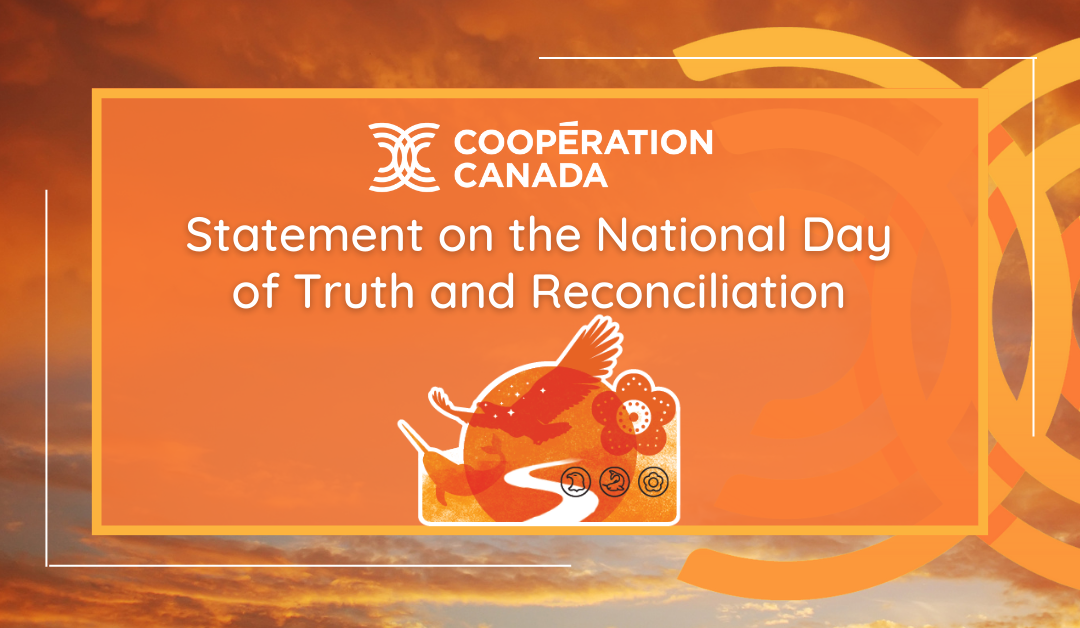
by Cooperation Canada | Sep 29, 2023 | Advancing Equity, News, Statement
On September 30, 2023, Cooperation Canada will mark the third National Day for Truth and Reconciliation. Our offices will be closed on October 2, 2023. We are encouraging our team, members and partners to reflect on the historic and ongoing violence committed against Indigenous Peoples on Turtle Island, take steps to advance the Calls to Action and Calls to Justice to realize the rights of Indigenous Peoples, connect with and celebrate diverse Indigenous cultures and wisdom, and honour the land and its ancestral keepers.
Over the past year, unprecedented forest fires impacted Indigenous and non-Indigenous communities across Turtle Island. Political leaders were urged to search the Prairie Green landfill for the remains of Morgan Harris and Marcedes Myra. The trauma and lasting impacts of Canada’s residential school system remain, as the search for unmarked grave sites continues across Turtle Island for many Indigenous communities. The impacts of colonization are a call to action for decolonization, reconciliation and concrete steps to advance the rights of Indigenous Peoples.
As early and recent settlers and visitors on this land, the Cooperation Canada team recognizes the historic and ongoing abuse and trauma inflicted by colonization on Indigenous Peoples. The team has been encouraged to join cultural events, learning circles, take action and hear from storytellers to support advancement on their individual responsibilities to reconciliation.
In the coming months, Cooperation Canada will release its Anti-Racism, Equity, Diversity, Inclusion and Justice Strategy and Action Plan (2023-2026). Following over a year of board and team engagement and support from experts at SLD Consulting and Quakelab, the coming strategy includes a commitment to strengthening relationships with Indigenous communities, culminating in a roadmap to support Cooperation Canada’s commitment to reconciliation and Indigenous rights.
Cooperation Canada also continues to advance our collective duty towards reconciliation. Working with Oxfam Canada, we supported the creation of an informal network for Reconciliation and Indigenous Rights. Through this network, organizations working in international cooperation have shared how they are advancing reconciliation within their organization and in partnership with Indigenous Peoples in Canada and beyond. The network serves as a space for candid and humble discussions, sharing and learning.
Reflection is an important part of marking national days of recognition and often a starting point for engagement and action. A key part to meaningful and impactful decolonization and reconciliation work is being intentional and honest. This year, the Anti-Racist Cooperation (ARC) Hub has prepared a set of questions to help guide these reflections in the spirit of building connections and relationships.
For organizational, collective reflections:
- How are we building/creating spaces for Indigenous People, as partners or staff, to thrive in our organizations?
- How do we value Indigenous knowledge and wisdom in our organization?
- What barriers exist within our organization for Indigenous participation and ways of working? How can we reduce or get rid of these barriers?
For personal reflections:
- How does reconciliation inform and impact my own work here and in other communities?
- Why is it important for me to support Indigenous People and their efforts towards decolonization on Turtle Island?
- Other than the land honouring and recognitions we do at our gatherings, what do I know about the Indigenous communities around me?
Cooperation Canada acknowledges the international cooperation sector has much work to do to confront colonial legacies both in terms of how organizations operate on Turtle Island and in global collaboration. In the coming year, Cooperation Canada will begin discussions with its members to review of its Code of Ethics. These efforts will include discussions with members on integrating Indigenous ethics and our shared commitment to reconciliation into the renewed Code of Ethics. Decolonization is a practice and one that requires personal and organizational commitment and effort. We look forward to working with our membership, Indigenous Peoples and partners to advance reconciliation and decolonization in the coming year.
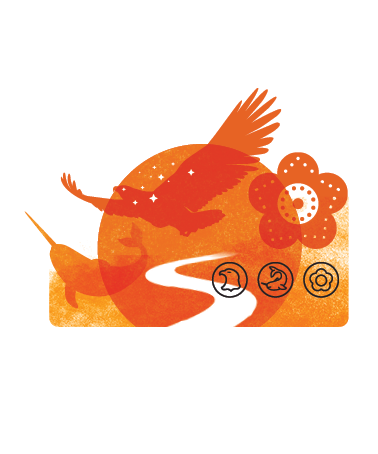
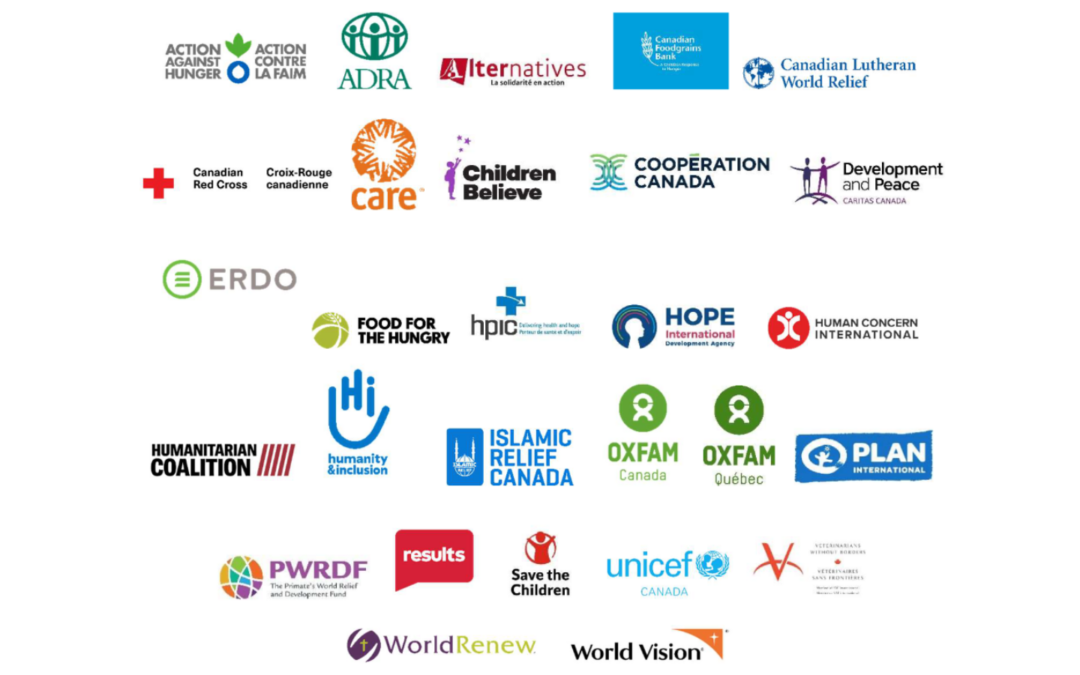
by Cooperation Canada | Apr 14, 2023 | Humanitarian Assistance, News, Statement
A coalition of leading Canadian humanitarian and development organizations is urging the Government of Canada to take action on the escalating global hunger crisis as G7 foreign ministers meet April 16-18.
Read our letter here
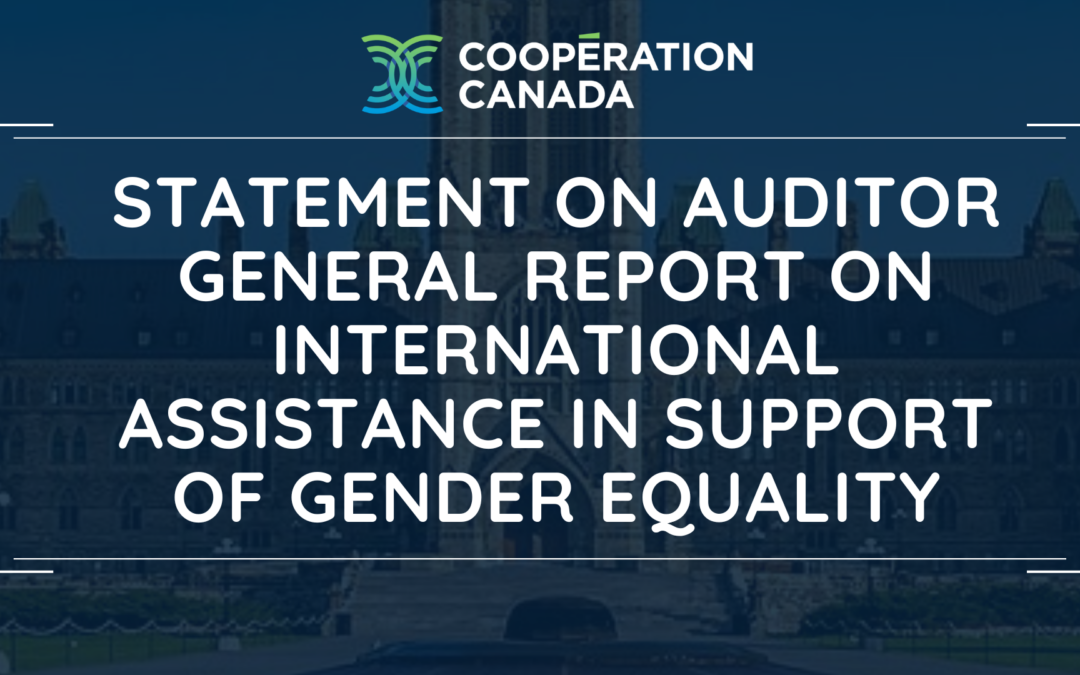
by Gabriel Karasz-Perriau | Mar 27, 2023 | Development Effectiveness, News, Statement
Today the Auditor General of Canada released the Report on International Assistance in Support of Gender Equality.The report focused on bilateral development assistance programming from 1 April 2017 to 31 March 2022, which represents an average of $3.5 billion per year.
The report concludes that Global Affairs Canada was not able to demonstrate how Canada’s Feminist International Assistance Policy contributed to improving gender equality in low- and middle-income countries. This finding is linked to weaknesses in Global Affairs Canada’s information management systems, an inadequate focus on outcomes against policy goals and the need to look beyond gender and age in the department’s project-level gender equality assessments to take a more inclusive approach that considers how other aspects of identity should inform programming.
The Auditor General also found that the department did not meet two out of three spending commitments. While Global Affairs Canada consistently exceeded its 80% gender-integrated spending commitment for projects that integrate gender equality, it did not quite meet the commitment for 15% of projects to target gender equality as the main project objective, and for 50% of bilateral funding to go to projects in sub-Saharan Africa.
Cooperation Canada commends the Government of Canada’s commitment to gender equality and its global leadership on feminist programming, guided by Canada’s Feminist International Assistance Policy. Canada’s global leadership on funding women’s rights organizations and movements, sexual and reproductive health and rights, and paid and unpaid care work is having transformational impacts on the lives of women, girls and gender diverse people around the world. In addition, the integration of gender equality throughout Canada’s international assistance programming makes Canada the top bilateral donor on gender equality according to the Organization for Economic Co-operation and Development.
“The launch and the implementation of the Feminist International Assistance policy has been a huge undertaking. It was – and is – the right vision at a time when women’s rights and progress on gender equality are under threat around the world. We are proud of Canada’s global leadership as gender equality champions,” said Kate Higgins, Chief Executive Officer of Cooperation Canada.
Cooperation Canada appreciates Global Affairs Canada’s agreement with the report’s recommendations and promise to take swift corrective measures. The weaknesses identified in the Auditor General’s report are issues that Cooperation Canada members have been working closely with Global Affairs Canada to address in recent years. These efforts have accelerated in past months as Cooperation Canada members work closely with Global Affairs Canada to inform the transformation of internal information management and granting and monitoring systems. We are encouraged by the priority Global Affairs Canada is giving to this work, and trust that initiatives like the Grants and Contributions Transformation initiative will improve monitoring and reporting systems and increase overall accountability to both Canadian taxpayers and country partners.
Cooperation Canada is also encouraged by the government’s commitment to supporting an intersectional approach to international assistance and building the collective capacity of those engaged in Canadian international assistance to do this critical work, including through the government’s support of the Anti-Racist Cooperation (ARC) Hub and DIGNA, hosted by Cooperation Canada.
The Auditor General’s recommendation to more effectively capture the impact of Canadian international assistance is a critical reminder about the importance of finding effective ways to document and demonstrate the difference that Canadian international assistance is making around the world, focusing on aggregate impact and long-term outcomes.
“We know that Canadian international assistance is helping save and change lives around the world every day,” Kate Higgins said. “But there is more that the Canadian government and its partners can do to track, document and communicate impact to Canadians. We hope that the findings of the Auditor General’s report push us to continue to invest in demonstrating the impact of our collective efforts towards gender equality and a safer, fairer and more sustainable world,” she said.







